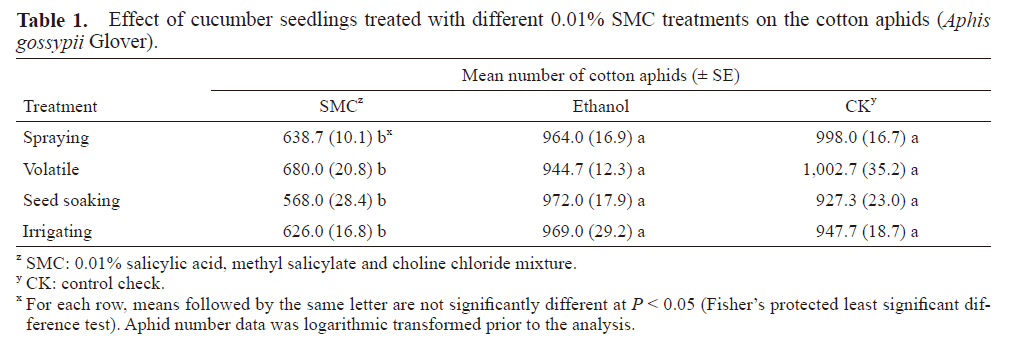All issues

Author:Yaw-Jen Dong and Bei-Chen Hsiu*
Abstract:
This study presents the effect of 0.01% SMC (0.01% mixed solution of salicylic acid, methyl salicylate and choline chloride) on cucumber seedlings and cotton aphid (Aphis gossypii Glover). Significant higher height and number of leaves and flowers were found on the cucumber seedlings sprayed with 0.01% SMC than control. Cotton aphid number from cucumber seedlings treated with 0.01% SMC by spraying, volatile, seed soaking and irrigating were ca. 64.0, 67.8, 61.3 and 66.1%, respectively, of that on control cucumber seedlings. Cucumber seedlings sprayed with 0.01% SMC one time could induce defensive effect to cotton aphid and effectiveness lasted 5 wk. Results from outdoor pot tests showed that significant higher cumulative natural enemies number of cotton aphid on the cucumber seedlings ‘Xin mi’, ‘Xiu yan’ and ‘A xiu’ sprayed with 0.01% SMC than control and pesticide treatment; cotton aphid numbers were ca. 67.3, 80.1 and 89.7%, respectively, of that on control cucumber seedlings but all significant higher than pesticide treatment. These results revealed that 0.01% SMC could promote growth of cucumber seedlings and reduce cotton aphid infestations. The 0.01% SMC could be as an assistant tool for cotton aphid non-pesticide control program. Farmland tests are necessary to confirm the efficiency of this treatment before further use.
Key words:Cotton aphid, Salicylic acid, Methyl salicylate, Choline chloride, Induced defense
Download:![]() PDF Links
PDF Links
- 1. Using Digital Soil Mapping to Predict Soil Organic Carbon Stocks in Zhuoshui River Basin
- 2. Taxonomic Review of the Genus Asiophrida Medvedev, 1999 in Taiwan (Insecta: Coleoptera: Chrysomelidae: Galerucinae: Alticini), with Notes on Biology
- 3. Development of a Technique for Forecasting (or Pre-Detection) Anthracnose Disease Incidences of Green Mature Bagging Mango Fruits
 Submit your manuscript
Submit your manuscript
 Guide for authors
Guide for authors